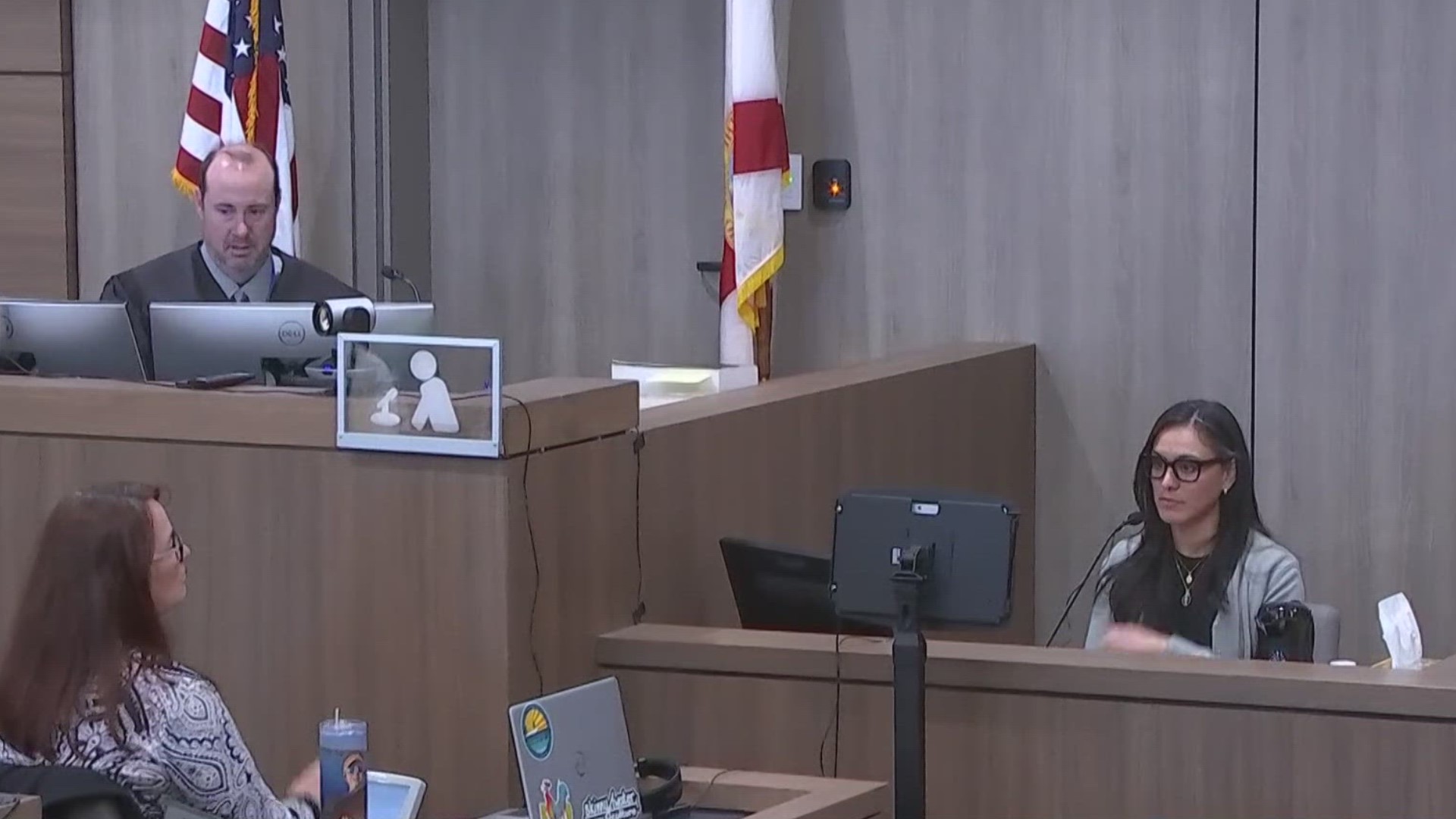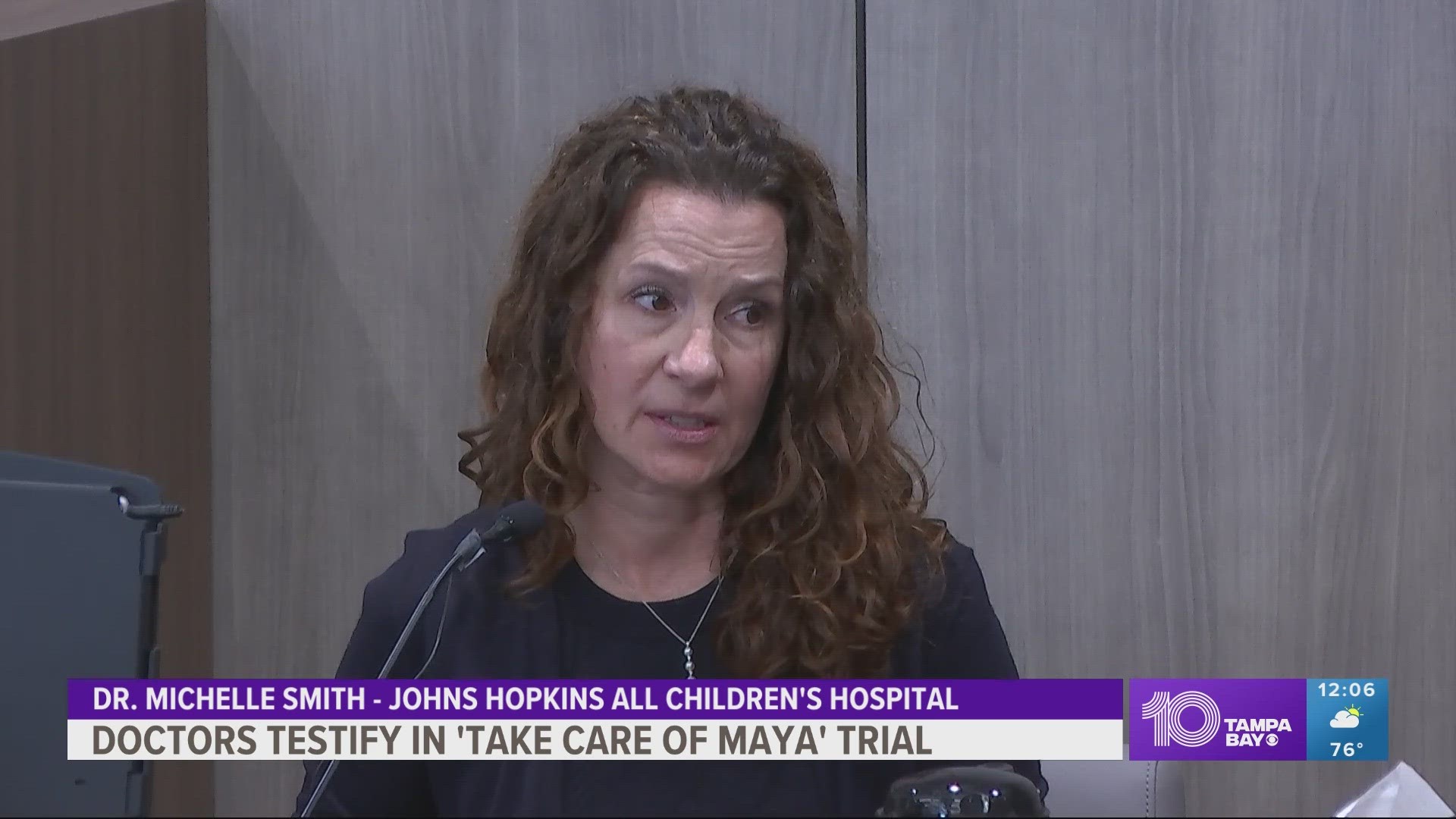VENICE, Fla. — A number of medical staff took the stand on Thursday as defense witnesses in the multi-million dollar lawsuit against Johns Hopkins All Children's Hospital.
Doctors and nurses told jurors about interacting with the Kowalski family when their then 10-year-old daughter Maya was admitted into the Pediatric Intensive Care Unit. Maya's dad Jack had taken her to the emergency room in October 2016 after she complained of excruciating pain from her condition, Complex Regional Pain Syndrome.
The visit to the ER happened a few months after Jack and Beata Kowalski had taken the wheelchair-bound girl to Mexico for ketamine coma therapy, prescribed by her doctors, to help with her pain. A relapse had Maya complaining of abdominal pain and expressing other symptoms, according to court testimony.
However, the medical staff from All Children's painted a different picture for jurors in hopes of showing why they had so many concerns about Maya. They included the child's alleged use of profane language and an unusual use of medical terminology to demand specific treatment and drugs.
"In my presence, so she was saying the 'F' bomb. 'I want my F***ing sedation, I want my F***ing sedation' and then she called Dr. Teppa, I was there when she called Dr. Teppa a 'F***ing A**h***'. She said, 'Shut up you 'F***ing A**h***'" Johanna Klink, a former registered nurse who worked at Maya's bedside, said.
"She said the whole word and we were shocked. I saw Dr. Teppa's face and it was like, I don't think anyone had ever said that to her," Klink said.
"Here is a 10-year-old little girl, it was unprovoked. It was in the morning, we had just walked in. I don't know why that happened and where that came from," she added.
"She would say things like 'I need you to push the medicine' and that's something I only hear amongst us in the medical field and that just stuck in my head, for a 10-year-old," Dr. Beatriz Teppa-Sanchez, a critical care physician at the PICU, said.
Dr Teppa-Sanchez said she was an attending on the team trying to help Maya.
"She was asking me to please start those medications and that I needed to intubate her," she added.
Medical staff described the state of the day Maya was in the PICU as chaotic and stressful. They said because Maya's stories about her symptoms were not consistent, they worked to find ways to first understand what was wrong with her and also treat the pain she complained about.
"We gave her the Benzodiazepines, the pain thing came, we started talking about a plan, and things kind of simmered down and she was already on the monitors," Dr. Teppa-Sanchez said.
While one doctor said Beata Kowalski, who was also a nurse, was polite and calm, others described her as "erratic." Teppa-Sanchez said she was aggressive in her demands for high doses of ketamine and pain medication and often wouldn't agree with some of the treatments they recommended.
"She said we could not do the study unless she was sedated," Teppa-Sanchez said in reference to an MRI. Other doctors also testified a refusal for psychiatric assessment.
Dr. Michelle Smith, another critical care physician, said she was most alarmed by the requests for drugs she considered risky for a child.
"She wanted an intrathecal infusion pump," Dr. Michelle Smith said. "It's a pump that would be inserted under the skin and then there is a catheter that goes into the area around the spinal cord and it can be used to infuse various medications to help treat various chronic pain."
"The only time I have patients with intrathecal pain pumps is in compassionate care usually with significant pain from cancer," she said.
The doctors said the requests were made for not only ketamine but also high doses of propofol.
"It was at least way above what I was comfortable with. We were concerned about the risks of side effects," Teppa-Sanchez said.
There was also the issue of transferring her to Nemours Children's Hospital in Orlando which had a pain specialist but that plan was rejected by Beata.
Jack Kowalski previously testified that they had initially agreed to the transfer but they declined it when they discovered the hospital had coded Maya's diagnosis as Munchausen Syndrome and not CPRS.
Dr. Teppa-Sanchez said as she spoke with Beata, she also learned about her home therapy for Maya which she believed was outside of the prescribed protocol.
"She was doing IV infusions at home and said that she would do them herself and IVIG," Teppa-Sanchez said.
They also revealed that there were instances that conversations or statements made by Maya and Beata that raised concerns about their mental health state.
"She said, about the sedation part, 'And I'm tired of all these lies. My life is a lie.' That struck me, that struck me very hard. It sounded like it was a cry for help," Klink said about Maya.
"The mother stated that she is tired and extremely stressed and that at times she wants to die, in quotes and she also expressed that when Maya is in pain and that she also expressed she wants to go to heaven, in quotes," Teppa-Sanchez said, reading from her own hospital notes.
It's around this time Dr. Sanchez says she sought guidance from Dr. Sallie Smith with the Child Protective Team.
Plaintiff counsel had an opportunity on cross-examination to grill the witnesses including about text messages between Dr. Teppa-Sanchez and another colleague where they referred to Maya as the "ketamine girl" in discussing Beata's suicide three months later.
Teppa-Sanchez said it was not out of the ordinary for some medical staff to refer to patients in unique code names related to their diagnosis or treatment to help remember them and avoid identifying them by name. When jurors asked Klink the same question, she said she did not recall the nickname and that some people would use room numbers to avoid naming the patient. Both said the use of a code name is never intended or used in a derogatory manner.
The family is suing the hospital for medical malpractice, battery, and false imprisonment for keeping Maya from them for 87 days.
They also blame hospital staff for Maya's mother's suicide over allegations of child abuse. A former Sarasota Sheriff's deputy who was called to investigate those child abuse claims is expected to take the witness stand Friday morning.


